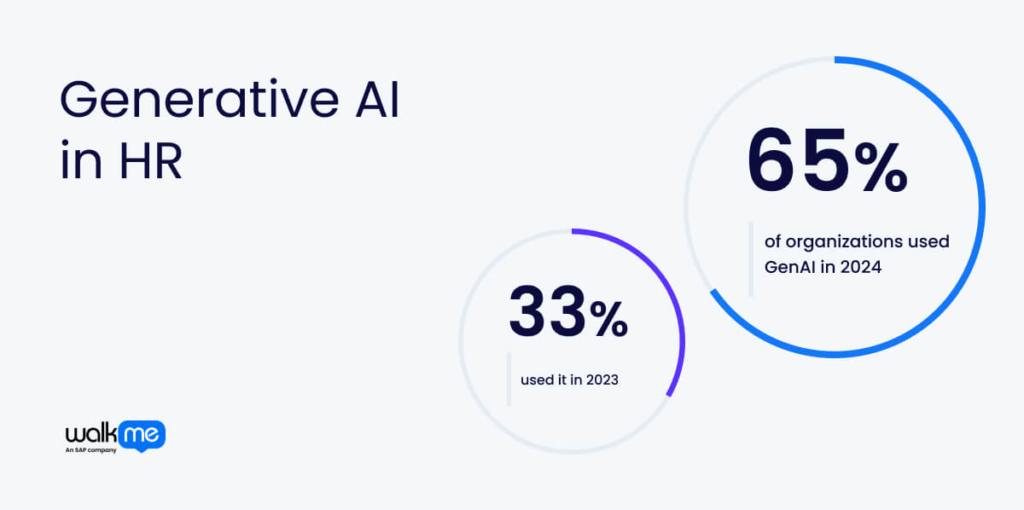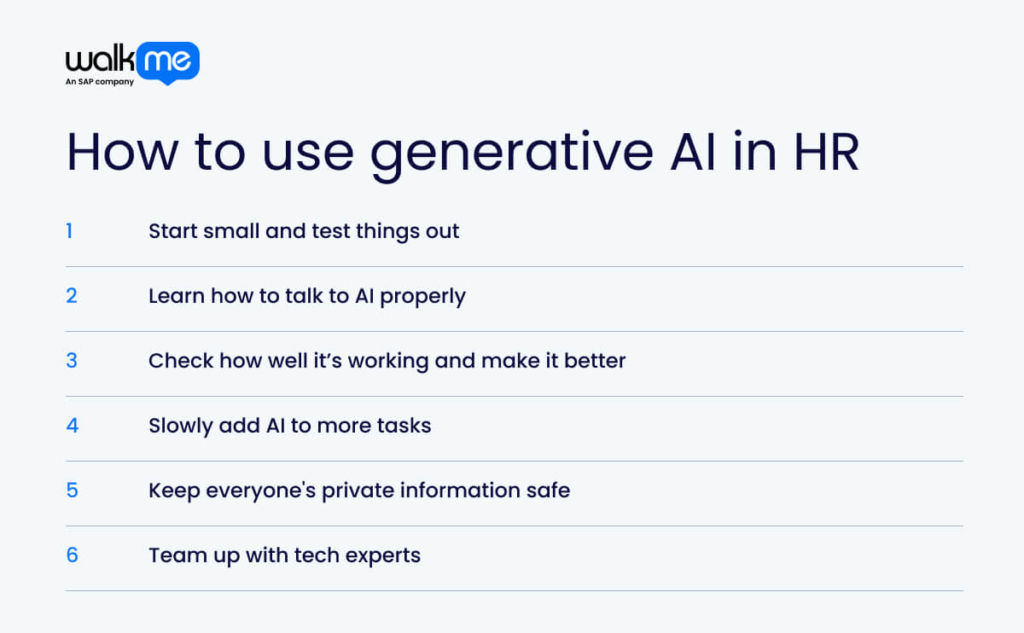Generative AI goes beyond generating content; it can automate processes, create realistic simulations, and support complex decision-making.
The role of generative AI is expanding quickly in HR. Trends show that HR teams face mounting pressure to streamline hiring, retain employees, and plan effectively. Generative AI can help meet these challenges head-on.
65% of organizations used GenAI in 2024, up from 33% in 2023. However, only 50% of U.S. employers use GenAI in HR practices.

Generative AI lets HR pinpoint candidates, predict turnover, and adjust to the workforce’s needs. HR teams must think strategically and adopt a smart approach to generative AI.
This article provides an overview of generative AI in HR. We will discuss its definition, importance, impact, and use and look at some real-world examples.
What is generative AI in HR?
Generative AI in HR refers to using advanced machine learning algorithms to analyze existing data and generate new content or solutions that enhance and streamline HR functions.
Let’s take a closer look at three important HR areas that help explain what generative AI is:
Content
Generative AI can automate the creation of job postings, training materials, and communications management. It quickly generates personalized, high-quality content, saving time and keeping things consistent. This lets HR teams spend more time on strategic work while improving engagement with potential and current employees.
Data communication
Generative AI helps HR teams communicate better by automatically answering common employee questions and creating reports or messages. For example, it can write personalized replies to questions about benefits or generate reports on employee performance. This saves time and allows HR to focus on more important tasks.
Coding
Generative AI can even help with coding. It automates the creation of code for HR workflow software. This speeds up custom tool development, simplifies updates, and makes adding new features a breeze. It reduces reliance on manual coding, improves business efficiency, and frees HR to focus on innovation.
Why is generative AI in HR important?
A new survey has revealed that most HR leaders in the UK are yet to use generative AI despite being interested in it. This gap highlights the need for HR teams to act quickly and strategically to adopt generative AI.
The growing interest in generative AI among HR leaders signals its potential to reshape the industry. However, the lack of widespread adoption reveals a critical opportunity gap.
As HR teams face increasing pressures to enhance the employee experience, generative AI offers some powerful advantages.
In talent acquisition, generative AI can create personalized job descriptions tailored to specific candidate profiles, improving recruitment efficiency. It can also generate custom interview questions and assess resumes, helping HR teams quickly identify top candidates.
Generative AI can assist in employee retention by creating customized resources to enhance engagement and satisfaction. For example, it can generate personalized onboarding materials, or individualized training content based on each worker’s role and aspirations.
How does generative AI impact HR?
Understanding how generative AI impacts HR and its functions is important.
As more companies adopt AI, the nuances of its applications will shape how HR teams operate in the future.
Let’s take a look at how generative AI will impact HR:
Streamlining recruitment processes
Generative AI helps HR teams speed up hiring by automating tasks like resume screening, writing job descriptions, and answering applicant questions. It can match candidates with roles by analyzing their skills and experiences, ensuring a better fit. This technology saves time, reduces bias, and allows HR professionals to focus on personal, strategic tasks like interviews and building relationships with potential hires.
Enhancing employee training and development
AI can create personalized employee training plan based on an employee’s role, skills, and career goals. Generative AI designs engaging materials like videos, interactive lessons, and quizzes tailored to personal learning styles. Offering real-time feedback and adaptive content ensures employees learn effectively and at their own pace. This approach boosts productivity and encourages continuous learning and growth within the organization.
Improving employee communication
Generative AI simplifies communication management by creating clear, engaging messages, FAQs, and policies for employees. It can draft responses to common questions or craft announcements, saving HR teams time. AI-powered chatbots also provide 24/7 support for employee inquiries, from benefits to leave policies. Generative AI makes information more accessible and creates a responsive and connected workplace.
How is generative AI used in HR?
Generative AI in HR is reshaping how teams handle tasks like recruitment, performance reviews, and employee communications.
HR teams must understand this technology to leverage its potential to reduce administrative burdens and ultimately stay ahead in an increasingly competitive job market.
Let’s take a look at how generative AI is used in HR:
Automating recruitment content
Generative AI can help HR teams quickly create job descriptions, interview questions, and answers to candidates’ questions. For example, it can write a job description based on a company’s needs, making it easier to attract the right candidates.
Interview questions can be created that fit a candidate’s skills and experience. Generative AI can even respond to questions from job applicants, saving HR time. This makes the recruitment process faster and ensures clear and consistent communication.
Personalized employee development plans
HR can create employee development plans with generative AI specific to each employee. It can analyze employee data, like their strengths and weaknesses, and suggest personalized learning resources such as online courses or workshops.
Generative AI can also recommend career growth opportunities that match an employee’s skills, like new roles or projects. This personalization helps employees feel more supported and gives them clear paths to improving their abilities. For HR, it makes managing employee development easier, boosting satisfaction and assisting people in growing in their careers.
Streamlining performance reviews
Generative AI helps HR create personalized performance reviews for employees. It analyzes performance data and automatically writes feedback, highlighting an employee’s strengths and areas for improvement.
It can also suggest goals for the future, helping employees know where to focus their development. Since the feedback is based on data and not just opinions, the performance review process is faster and more consistent. Generative AI also helps HR give clear, helpful feedback that helps employees grow while saving time and reducing bias in the review process.
Real-world examples of generative AI in HR
One of the easiest ways of implementing generative AI in HR is by looking at examples of companies that have done it successfully.
In this section, we are going to look at three businesses that have implemented generative AI into their HR processes:
Veritone Hire: Using AI to create better job ads
Veritone Hire uses generative AI to improve job advertisements by automatically creating personalized content that appeals to the right candidates.
The AI analyzes data on what job seekers look for, the language that grabs their attention, and what makes them apply. Based on this, it generates optimized job descriptions, interview questions, and responses to inquiries, ensuring consistent communication with candidates.
Generative AI reduces the time spent writing job ads and allows HR teams to focus on engaging with top talent. It also continuously updates the content to improve its effectiveness, helping companies find the best candidates faster.
RingCentral: Using AI to build diverse teams
RingCentral uses generative AI to improve its hiring process and boost diversity. The AI analyzes resumes and candidate profiles, identifying top candidates while specifically seeking diverse backgrounds.
It generates job postings with inclusive language to attract a wide range of applicants and remove unconscious bias from hiring decisions. Focusing on fairness, generative AI helps build diversity that brings different perspectives.
This approach supports a more inclusive company culture and ensures that all candidates have an equal opportunity, enhancing both the hiring process and team dynamics.
Manipal Health: Using an AI assistant for HR questions
Manipal Health uses a generative AI assistant to answer employee questions about HR topics, like benefits and pay, 24/7. Employees can ask the assistant anything, and it gives fast, helpful answers.
The more it’s used, the better it gets at understanding what people need. This saves HR workers time because they don’t have to answer the same questions repeatedly.
Employees get quick answers whenever needed, making HR work smoother and faster. This shows how generative AI can make HR easier for everyone in the company.
How to use generative AI in HR

Understanding how to use generative AI in HR is essential. It reshapes key functions like recruitment, training, and employee engagement.
With the power to automate tasks and generate insights, generative AI helps HR teams operate more efficiently and make a bigger organizational impact.
Let’s look at how to use generative AI in HR:
Step 1: Start small and test things out
When using generative AI in HR, it’s best to start with simple tasks to avoid problems. For example, use AI to create job descriptions, draft interview questions, or respond to common employee questions. This lets your team test how well the AI works without risking major mistakes.
Step 2: Learn how to talk to AI properly
Think of generative AI as a smart but very literal friend. You need to be frank and clear about what you want. When HR teams use AI, they must learn how to provide good instructions or “prompts.” For example, if you want the AI to help evaluate job candidates or create training materials, you need to tell it exactly what you’re looking for, what style to use, and what important points to include. The clearer you are, the better your results will be.
Step 3: Check how well it’s working and make it better
After you start using generative AI, you must ensure it’s doing a good job. Look at whether it’s getting things right, if its work is useful, and how much time it saves. For instance, if AI is helping to look through job applications, check if it’s picking out the right kinds of candidates. If something’s not working well, you can adjust how you use the AI or give it better instructions.
Step 4: Slowly add AI to more tasks
Once you know that AI works well for simple things, you can use it for bigger tasks. You started by having it answer basic questions, and now you want it to help write employee reviews or create training lessons. A slow approach helps everyone get used to working with AI without feeling overwhelmed.
Step 5: Keep everyone’s private information safe
Protecting personal information when using generative AI in HR is important. To keep data safe, make sure the AI follows rules like GDPR. Work with experts to choose secure generative AI tools and check for security risks regularly. Remove personal details like names before using data to ensure that employees’ privacy is protected.
Step 6: Team up with tech experts
Working closely with the IT department is important when using generative AI in HR. They can help pick the right AI tools, ensure everything connects properly, and solve technical issues. For example, IT ensures it connects with your HR system if you’re using generative AI to create job descriptions.
What is the future of generative AI in HR?
The future of generative AI in HR promises a shift from administrative support to strategic partnership.
We can expect AI to anticipate workforce needs, predict skill gaps, and even craft real-time tailored growth paths for employees.
Advanced generative AI in the workplace may assist HR teams in navigating complex challenges, such as enabling inclusive cultures or responding to evolving workforce management expectations.
AI-driven insights will allow HR to make increasingly sophisticated, data-informed decisions that align talent management with long-term business goals.
Ultimately, generative AI will likely enable HR to shape a more adaptive, personalized, and proactive workplace of the future.
FAQs
The ROI of AI in HR is significant, as it automates tasks like job descriptions, candidate screening, and performance reviews, saving time and reducing costs. It enhances employee training and retention by personalizing development plans, leading to improved productivity. This results in a more efficient workforce and better overall business outcomes.

